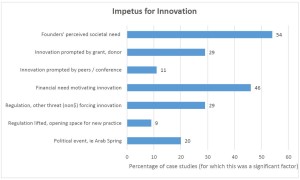By JJ Robinson, journalist/editor and lead author
Media innovation and startups are subjects talked about all over the world but little studied outside the US and Europe.
For our report ‘Publishing for Peanuts: Innovation and the Journalism Startup’, we sought out new and independent media outlets all over the world, and interviewed their editors and founders. The report, commissioned by the Open Society Foundation’s Program on Independent Journalism and produced at Columbia University’s School of International and Public Affairs (SIPA), features detailed interviews with journalists from 35 outlets in countries ranging from Australia and South Africa to Mexico and the Maldives. We sought to understand not just their journalism objectives, but how they pay their bills, innovate to solve local problems, and live to publish another day.
 We found that media innovators are passionate about committing journalism and often launch their startups because they feel there is a gap in the information ecosystem that needs to be filled. Some examples of their reporting: providing data on government spending in India, in-depth features on the Middle East, reporting on the Brazilian judicial system, or geomapping of rhino poaching and prosecutions in Africa. Others use technology work-arounds to compensate for deficient local infrastructure such as distributing news via Whatsapp, using drones to bypass uncooperative local authorities in Africa, or creating mobile phone-based broadcasting networks to reach areas of rural India entirely unserved by traditional media.
We found that media innovators are passionate about committing journalism and often launch their startups because they feel there is a gap in the information ecosystem that needs to be filled. Some examples of their reporting: providing data on government spending in India, in-depth features on the Middle East, reporting on the Brazilian judicial system, or geomapping of rhino poaching and prosecutions in Africa. Others use technology work-arounds to compensate for deficient local infrastructure such as distributing news via Whatsapp, using drones to bypass uncooperative local authorities in Africa, or creating mobile phone-based broadcasting networks to reach areas of rural India entirely unserved by traditional media.
Most operations are small and typically run by their founders, all of whom have backgrounds in journalism. Retrenchment by or disillusionment with mainstream media seems a key motivation for starting an independent media outlet. None of the founders said they were motivated by financial reasons, although most hope to eventually break even. The vast majority are aware they lack skills in other areas needed to be successful, particularly around business/sales and web/technology. In fact, many valued the skills and experience offered by development partners as much as they did funding.
We noted a powerful need and opportunity for the provision of subsidized media services, ideally by an existing and trusted development partner. Few outlets could afford a full-time sales manager or web developer, but many said they were willing to pay for part-time remote assistance as they struggled to find qualified help sensitive to the needs of media. This was especially evident in the global south, and would be an effective and efficient way for media development agencies to help independent media outlets thrive.
No outlet told us they needed yet another twitter scraping tool. Instead the challenges were more prosaic: growing an audience, establishing credibility, diversifying revenue streams – very similar challenges to those facing media in the developed world.
We noted a keen interest among many outlets in the innovation of others – there appeared to be keen unofficial exchange of tricks and ideas at donor-sponsored events that brought independent media together. Many innovations, such as the Texas Tribune’s membership model, proved very portable across borders. We noted that independent journalism operations appear to be rather solitary affairs in many countries, and we suspect there is an opportunity for a peer-to-peer network that formalizes this currently haphazard and irregular cross-pollination.
As a tentative first step, we compiled the tips, tricks and innovations unearthed during our research into an ‘Innovation Index’, included in the report. While our list is by no means comprehensive, we hope that this makes our report of direct benefit to those on the front line of independent media.
JJ Robinson has worked as a journalist for 10 years, including four as editor of the Maldives’ first independent English-language news outlet. He covered crooked elections, political riots, Islamic extremism, human trafficking, grand corruption of the judiciary and was among the only foreign witnesses to the 2012 coup d’état that toppled the country’s first democratically-elected government. He was the Maldives’ Reuters correspondent and its Reporters Without Borders representative, and has appeared on the BBC, Radio Australia, Al Jazeera and others as a Maldives expert. He has guest-lectured on journalism and the Maldives at universities in Australia and Sweden, and appeared on regional freedom of expression advisory panels for the UN.


Comments (0)
Comments are closed for this post.